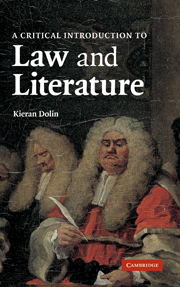Book contents
- Frontmatter
- Contents
- Preface
- Introduction to law and literature: walking the boundary with Robert Frost and the Supreme Court
- PART I EMINENT DOMAINS: THE TEXT OF THE LAW AND THE LAW OF THE TEXT
- PART II LAW AND LITERATURE IN HISTORY
- 3 Renaissance humanism and the new culture of contract
- 4 Crime and punishment in the eighteenth century
- 5 The woman question in Victorian England
- 6 The common law and the ache of modernism
- 7 Rumpole in Africa: law and literature in post-colonial society
- 8 Race and representation in contemporary America
- Conclusion
- Notes
- Bibliography
- Index
5 - The woman question in Victorian England
Published online by Cambridge University Press: 05 June 2012
- Frontmatter
- Contents
- Preface
- Introduction to law and literature: walking the boundary with Robert Frost and the Supreme Court
- PART I EMINENT DOMAINS: THE TEXT OF THE LAW AND THE LAW OF THE TEXT
- PART II LAW AND LITERATURE IN HISTORY
- 3 Renaissance humanism and the new culture of contract
- 4 Crime and punishment in the eighteenth century
- 5 The woman question in Victorian England
- 6 The common law and the ache of modernism
- 7 Rumpole in Africa: law and literature in post-colonial society
- 8 Race and representation in contemporary America
- Conclusion
- Notes
- Bibliography
- Index
Summary
For the common law of England, the Victorian period was at once an age of reform and an age of ideological consolidation. Faced with the unprecedented social problems created by the Industrial Revolution and the unplanned expansion of factory towns and cities, the inherited institutions of law, government and social order could not cope with the demands placed upon them. Seeking to avoid a political revolution, English legislators, writers and intellectuals endeavoured to create new concepts in and through the law – new legal entities, new rights and duties, new forms of identity – whilst conserving the major institutions of the state. Animated by a liberal ideology of freedom and a belief in evolutionary, organic modes of social development, they drew on a positivist theory of law as the command of a sovereign authority to implement a gradual programme of change through Parliamentary statute. To achieve this outcome they engaged in a series of remarkable struggles over words, fighting either to bring new words and hence new realities into the law, or to extend and adapt existing legal terms. In conducting their ‘symbolic revolution’ they developed a theory of reform, whereby established or traditional mechanisms were not overthrown but subjected to a test of their utility and efficiency. Under the inspiration of Jeremy Bentham, early Victorian reformers inaugurated the mechanistic reviews of social institutions that we now know as ‘cost-benefit analysis’ or more euphemistically, ‘quality assurance’.
- Type
- Chapter
- Information
- A Critical Introduction to Law and Literature , pp. 120 - 142Publisher: Cambridge University PressPrint publication year: 2007



